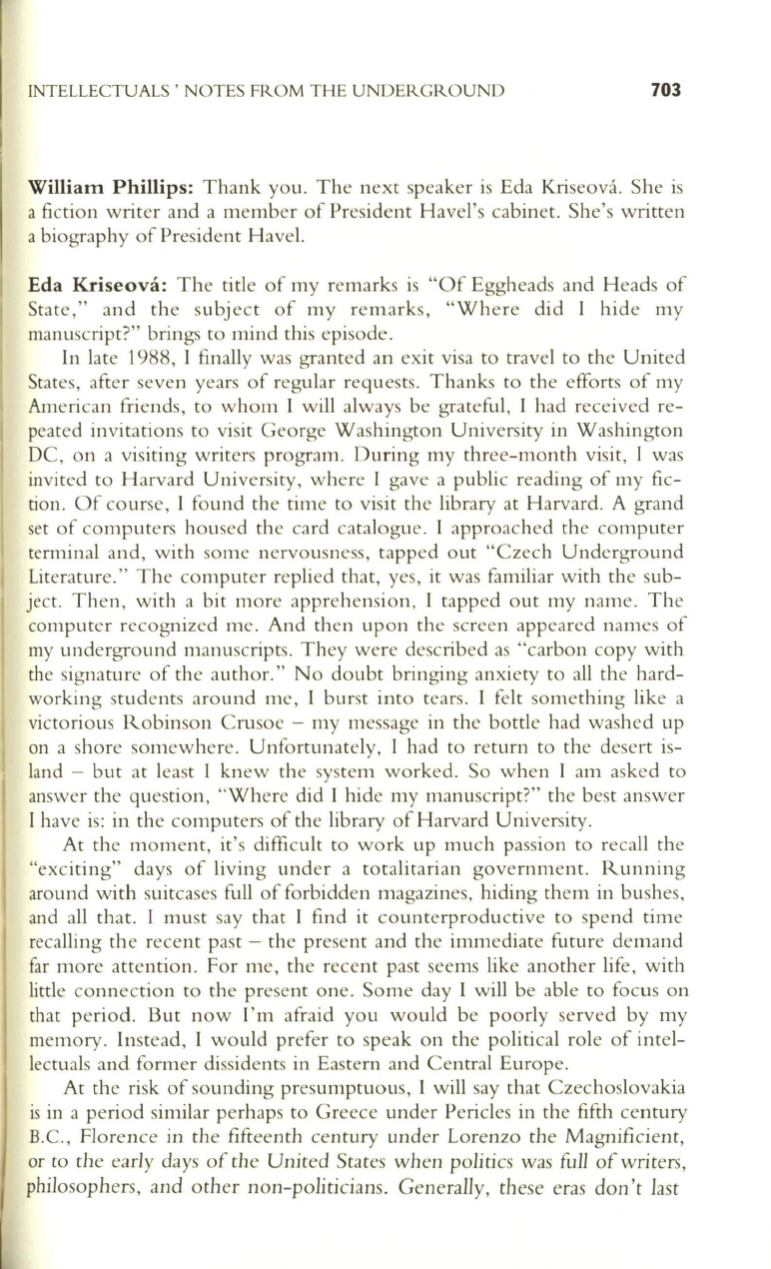
INTELLECTUALS' NOTES FROM THE UNDERGROUND
703
William Phillips:
Thank you. The next speaker is Eda Kriseova. She is
a fiction writer and a member of President Havel's cabinet. She's written
a biography of President Havel.
Eda
Kriseova:
The title of my remarks is "Of Eggheads and Heads of
State," and the subject of my remarks, "Where did I hide my
manuscript?" brings to mind this episode.
In late 1988, I finally was granted an exit visa to travel to the United
States, after seven years of regular requests. Thanks to the efforts of my
American friends, to whom I will always be grateful, I had received re–
peated invitations to visit George Washington University in Washington
DC , on a visiting writers program. During my three-month visit, I was
invited to Harvard University, where I gave a public reading of my fic–
tion . Of course, I found the time to visit the library at Harvard. A grand
set of computers housed the card catalogue. I approached the computer
terminal and, with some nervousness, tapped out "Czech Underground
Literature ." The computer replied that, yes, it was familiar with the sub–
ject. Then, with a bit more apprehension, I tapped out my name. The
computer recognized me. And then upon the screen appeared names of
my underground manuscripts. They were described as "carbon copy with
the signature of the author." No doubt bringing anxiety to all the hard–
working students around me, I burst into tears. I felt something like a
victorious Robinson Crusoe - my message in the bottle had washed up
on a shore somewhere. Unfortunately, I had to return to the desert is–
land - but at least I knew the system worked . So when I am asked to
answer the question, "Where did I hide my manuscript?" the best answer
I have is: in the computers of the library of Harvard University.
At the moment, it's difficult to work up much passion
to
recall the
"exciting" days of living under a totalitarian government. Running
around with suitcases full of forbidden magazines, hiding them in bushes,
and all that. I must say that I find it counterproductive to spend time
recalling the recent past - the present and the immediate future demand
far more attention. For me, the recent past seems like another life, with
little connection to the present one. Some day I will be able to focus on
that period. But now I'm afraid you would be poorly served by my
memory. Instead, I would prefer to speak on the political role of intel–
lectuals and former dissidents in Eastern and Central Europe.
At the risk of sounding presumptuous, I will say that Czechoslovakia
is in a period similar perhaps to Greece under Pericles in the fifth century
B.C.,
Florence in the fifteenth century under Lorenzo the Magnificient,
or to the early days of the United States when
politics
was
full
of writers,
philosophers, and other non-politicians. Generally, these eras don't last


